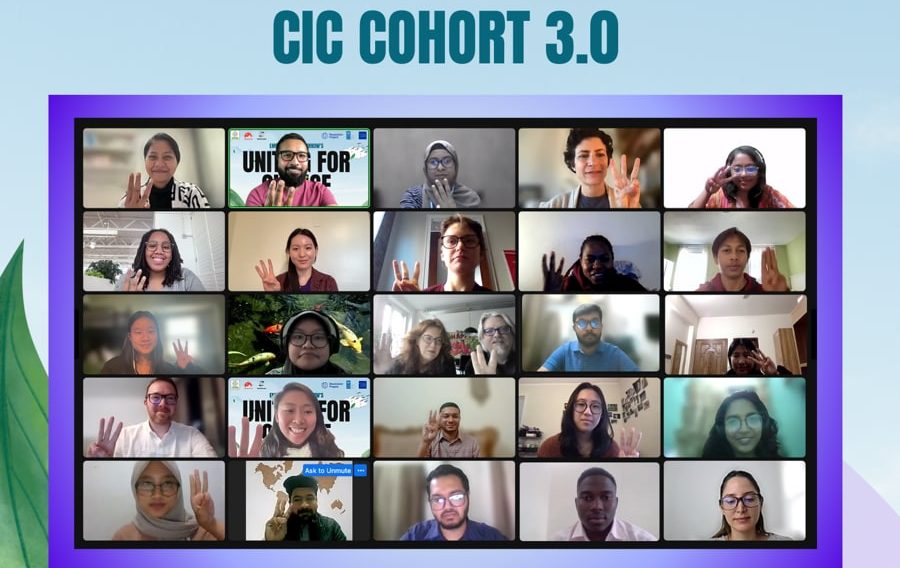
Imagine a bustling hive of young minds, buzzing with innovative ideas to combat climate change. That's the electric atmosphere the Climate Innovation Challenge (CIC) ecosystem fosters, a six-week program that brings together a diverse group of young people, project partners, mentors, and stakeholders from all over the world to tackle the growing challenges of climate change.
Early this month, CIC successfully concluded its third cohort where young people from across four continents collaborated with real-world companies to develop meaningful solutions to the ecological challenges facing the world today. Participants attended in-depth workshops on climate change and critical professional skills conducted by experts from leading institutions. They worked with project partners, mentors, and fellow participants to develop real-world solutions, gaining not only a deeper understanding of climate change but also valuable professional skills and lasting connections.
CIC recognizes that one of the most potent weapons against complex challenges lies in embracing fresh perspectives and out-of-the-box thinking. That's why fostering an open-minded approach is critical. CIC encourages holistic development, where every idea is rigorously examined and refined through collaborative efforts.
CIC is a six-week climate education and innovation program that connects youth from across four continents to real-world organizations. This provides access to quality, experiential learning opportunities where they can apply their skills and become future leaders and collaborators in sustainable solutions.
Students come together to learn from each other, attend five workshops on professional and climate skills, and work with project partners and mentors to develop solutions to critical ecological challenges.
This was the program's third cohort. Thirty students from 14 countries and 21 esteemed educational institutions participated, representing a diverse and global cohort of changemakers. The institutions included Ivy League institutions like Columbia University and the University of Pennsylvania, alongside prestigious universities such as Northwestern University, BRAC University, Dhaka University, and Bangladesh University of Professionals.
The program, which ran from January 4, 2024, to February 3, 2024, saw students collaborating with four promising climate-focused organizations spanning sectors like plastic recycling, carbon trading marketplaces, sustainable e-commerce, and AI-based waste segregation systems. These organizations, hailing from Bangladesh, the USA, and Germany, provided students with invaluable hands-on experience and exposure to real-world climate solutions.
Throughout the program, students engaged in virtual workshops, capacity development sessions, and peer feedback sessions, facilitated by esteemed partners UNDP Bangladesh Accelerator Lab and Columbia Climate School. The workshops focused on climate knowledge, business integration, and human-centric design, equipping students with the necessary skills and knowledge to tackle climate challenges effectively.
In the closing ceremony, all four teams presented their innovative ideas to a distinguished panel of judges, including Anjali Sarker, Director of Global Leadership Challenge at the University of Oxford, Seth Warren, CEO of MSII SDG Initiative, and Iffat Anjum, Head of Exploration at UNDP Bangladesh Accelerator Lab. Team TRACA emerged as the winner, while ECOWAVE secured the first runner-up position.
TRACA's winning proposal, the Climate Ambassador and Policy Development approach, empowers small climate-focused organizations to generate revenue through carbon trading, supporting both local communities and global climate efforts. Meanwhile, ECOWAVE's solution involves the production of recycled plastic bags for various settings, contributing to a sustainable recycling ecosystem.
The closing ceremony featured a keynote speech by Sandra Goldmark, Senior Assistant Dean for Interdisciplinary Engagement at Columbia Climate School and Director, Campus Sustainability & Climate Action & Associate Professor of Professional Practice at Barnard College. She emphasized the importance of radical collaboration, imaginative thinking, and leveraging individual superpowers in overcoming global climate challenges. She highlighted the complexity of climate change as a "wicked problem," necessitating multifaceted engagement and cooperation across all levels.
Since its inception, Climate Innovation Challenge has graduated 90 students from 23 countries and 54 educational institutions, positioning itself as a global leader in climate education and innovation. Managed by PathFinder and Explorate, and supported by UNDP Bangladesh Accelerator Lab, Columbia Climate School, and The Resolution Project, CIC continues to inspire and empower the next generation of climate leaders.
